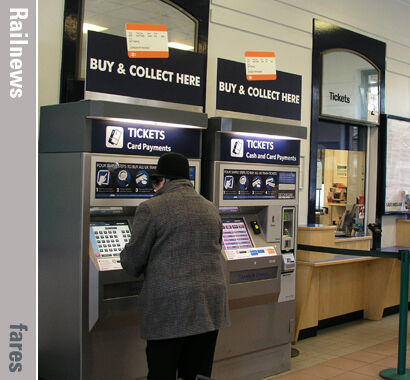The environmental charity Greenpeace has published proposals for a new flat-fare rail card, possibly costing £49 a month, which would allow unlimited travel on most trains.
The plan has been drawn up on behalf of Greenpeace by the high speed rail lobby group Greengauge21.
Some limits are likely. The card might not be valid on intercity services and could require a ‘top-up’ fare in the London area. The report also suggests that it could be first be made available in the North and Midlands of England as well as perhaps Scotland and South West England, to help balance the difference in spending on transport between those regions and the South East. It might also be issued only to younger people, at least at first.
The report, Fare Britannia, says such a reform would help to combat climate change by reducing carbon emissions from cars if their drivers started to use trains instead. It adds: ‘Transport itself is now the most stubbornly high emitting sector. Decarbonising cars and vans is essential.’
It concedes that electric vehicles will help, but also points out that many internal combustion cars are set to stay on the roads until the 2040s.
The report makes the case for reform, saying: ‘Without a different approach to ticketing – cheaper, simpler and more integrated across modes – the current damaging unsustainable status quo will continue.’
Such a card is already available in some continental countries. The first ‘Climate Card’ was launched in Austria in October 2021, to encourage people to switch to more energy efficient forms of transport. Germany followed suit, and there are now broadly similar products in Hungary, France and Portugal.
However, some countries have placed limits on the scheme, because of financial hurdles. In France, the Paris region elected to be excluded, because it was estimated that it would cost that region €18 billion a year. As in other countries, the French version cost €49, but it was only available in 2024 to about 700,000 people under the age of 27, and only during July and August.
Even so, the report goes on to claim that ‘The economic benefits will be experienced most across the English regions (and devolved nations, assuming the Scottish and Welsh authorities elect to join the scheme). It will help people access jobs and allow businesses to expand their employee catchments. It will encourage domestic and inward tourism, especially to less visited parts of the country.’
Such a card could be issued within three years, co-ordinated by Great British Railways.
In the report’s Foreword, Professor David Begg says: ‘Since 2010 fuel duty has been cut by 34 per cent in real terms costing the Treasury around £100 billion in lost revenue. This has made rail travel much less competitive compared to its main competitor, the car.
‘The pro car stance taken by the previous Government has come at a cost in terms of fewer trips by public transport, more traffic and congestion on the roads and increased CO2. The new Government needs to be fully aware of the consequences of continuing to reduce fuel duty in real terms which is why it is imperative that innovative measures should be considered.’
The Department for Transport said: ‘This government is committed to encouraging greener ways to travel and improving the state of public transport. That’s why we’re empowering local leaders to deliver better bus services, overhauling our railways to put passengers first and simplifying ticketing to deliver better value for money when taking the train.’


